Personal Development Activities Report for Management Skills Course
VerifiedAdded on 2022/01/19
|7
|1529
|119
Report
AI Summary
This report delves into personal development activities, focusing on adaptive skills applicable across various fields. It examines transferable skills, including the AIDA and Thomas-Kilmann models, and their application in a start-up context. The report outlines a personal development plan encompassing self-assessment, goal setting, planning, motivation, empowerment, conflict management, and team effectiveness. It explores the importance of these elements for individual growth and organizational success, discussing theories and practical applications. The conclusion highlights the significance of both leadership and management in fostering a thriving work environment, emphasizing the creation of an inspiring and engaging atmosphere. The report references various academic sources to support its findings.
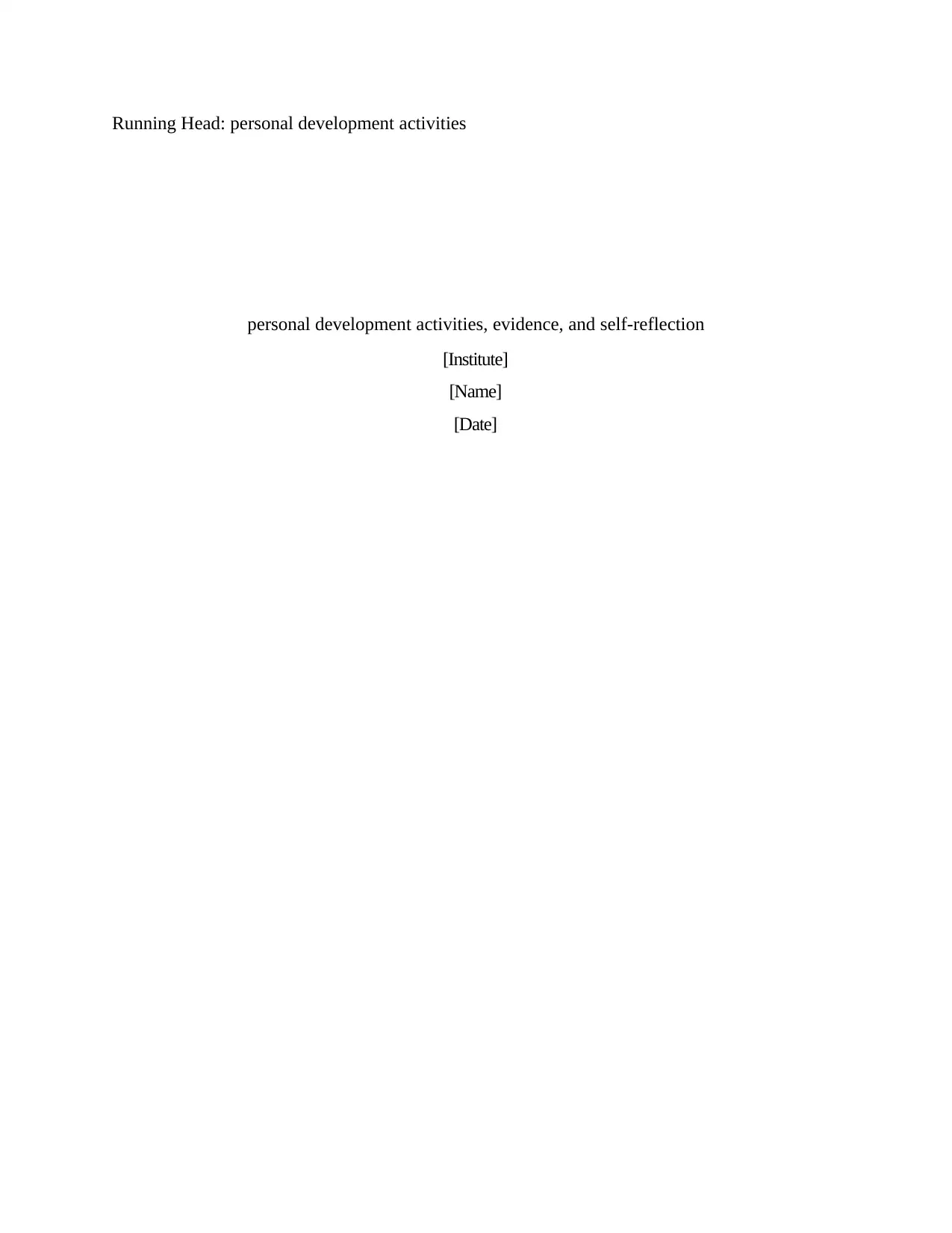
Running Head: personal development activities
personal development activities, evidence, and self-reflection
[Institute]
[Name]
[Date]
personal development activities, evidence, and self-reflection
[Institute]
[Name]
[Date]
Paraphrase This Document
Need a fresh take? Get an instant paraphrase of this document with our AI Paraphraser
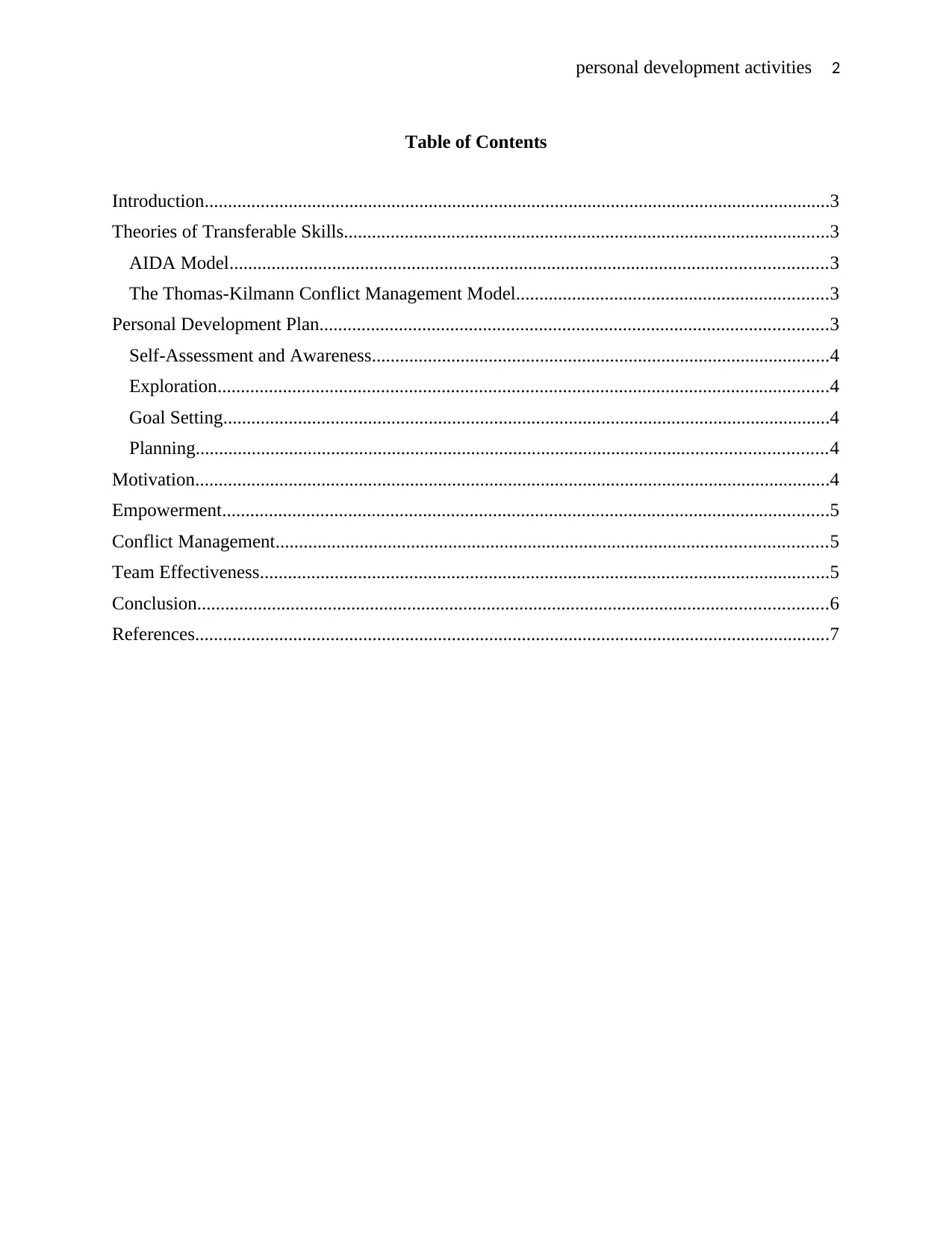
personal development activities 2
Table of Contents
Introduction......................................................................................................................................3
Theories of Transferable Skills........................................................................................................3
AIDA Model................................................................................................................................3
The Thomas-Kilmann Conflict Management Model...................................................................3
Personal Development Plan.............................................................................................................3
Self-Assessment and Awareness..................................................................................................4
Exploration...................................................................................................................................4
Goal Setting..................................................................................................................................4
Planning.......................................................................................................................................4
Motivation........................................................................................................................................4
Empowerment..................................................................................................................................5
Conflict Management......................................................................................................................5
Team Effectiveness..........................................................................................................................5
Conclusion.......................................................................................................................................6
References........................................................................................................................................7
Table of Contents
Introduction......................................................................................................................................3
Theories of Transferable Skills........................................................................................................3
AIDA Model................................................................................................................................3
The Thomas-Kilmann Conflict Management Model...................................................................3
Personal Development Plan.............................................................................................................3
Self-Assessment and Awareness..................................................................................................4
Exploration...................................................................................................................................4
Goal Setting..................................................................................................................................4
Planning.......................................................................................................................................4
Motivation........................................................................................................................................4
Empowerment..................................................................................................................................5
Conflict Management......................................................................................................................5
Team Effectiveness..........................................................................................................................5
Conclusion.......................................................................................................................................6
References........................................................................................................................................7
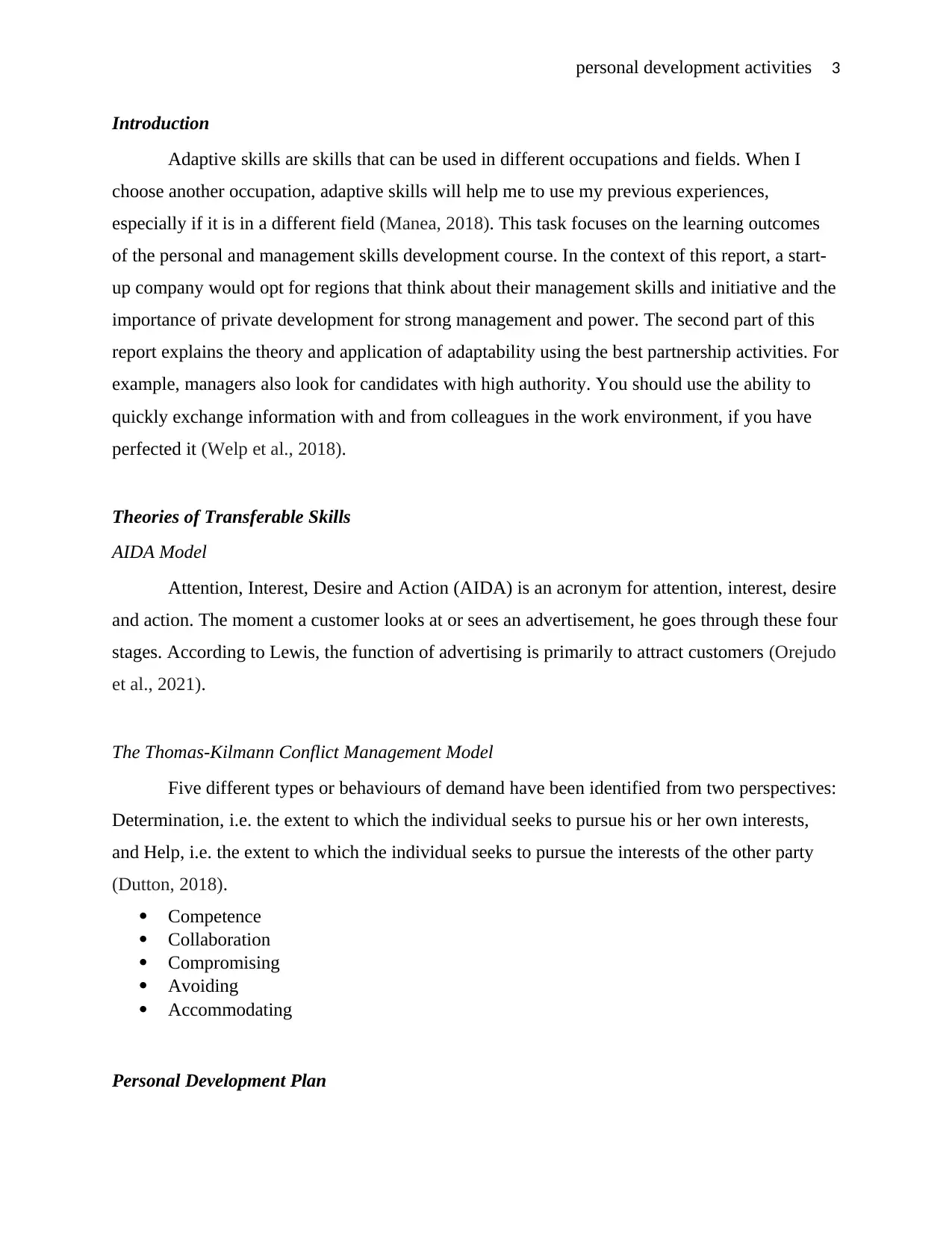
personal development activities 3
Introduction
Adaptive skills are skills that can be used in different occupations and fields. When I
choose another occupation, adaptive skills will help me to use my previous experiences,
especially if it is in a different field (Manea, 2018). This task focuses on the learning outcomes
of the personal and management skills development course. In the context of this report, a start-
up company would opt for regions that think about their management skills and initiative and the
importance of private development for strong management and power. The second part of this
report explains the theory and application of adaptability using the best partnership activities. For
example, managers also look for candidates with high authority. You should use the ability to
quickly exchange information with and from colleagues in the work environment, if you have
perfected it (Welp et al., 2018).
Theories of Transferable Skills
AIDA Model
Attention, Interest, Desire and Action (AIDA) is an acronym for attention, interest, desire
and action. The moment a customer looks at or sees an advertisement, he goes through these four
stages. According to Lewis, the function of advertising is primarily to attract customers (Orejudo
et al., 2021).
The Thomas-Kilmann Conflict Management Model
Five different types or behaviours of demand have been identified from two perspectives:
Determination, i.e. the extent to which the individual seeks to pursue his or her own interests,
and Help, i.e. the extent to which the individual seeks to pursue the interests of the other party
(Dutton, 2018).
Competence
Collaboration
Compromising
Avoiding
Accommodating
Personal Development Plan
Introduction
Adaptive skills are skills that can be used in different occupations and fields. When I
choose another occupation, adaptive skills will help me to use my previous experiences,
especially if it is in a different field (Manea, 2018). This task focuses on the learning outcomes
of the personal and management skills development course. In the context of this report, a start-
up company would opt for regions that think about their management skills and initiative and the
importance of private development for strong management and power. The second part of this
report explains the theory and application of adaptability using the best partnership activities. For
example, managers also look for candidates with high authority. You should use the ability to
quickly exchange information with and from colleagues in the work environment, if you have
perfected it (Welp et al., 2018).
Theories of Transferable Skills
AIDA Model
Attention, Interest, Desire and Action (AIDA) is an acronym for attention, interest, desire
and action. The moment a customer looks at or sees an advertisement, he goes through these four
stages. According to Lewis, the function of advertising is primarily to attract customers (Orejudo
et al., 2021).
The Thomas-Kilmann Conflict Management Model
Five different types or behaviours of demand have been identified from two perspectives:
Determination, i.e. the extent to which the individual seeks to pursue his or her own interests,
and Help, i.e. the extent to which the individual seeks to pursue the interests of the other party
(Dutton, 2018).
Competence
Collaboration
Compromising
Avoiding
Accommodating
Personal Development Plan
⊘ This is a preview!⊘
Do you want full access?
Subscribe today to unlock all pages.

Trusted by 1+ million students worldwide
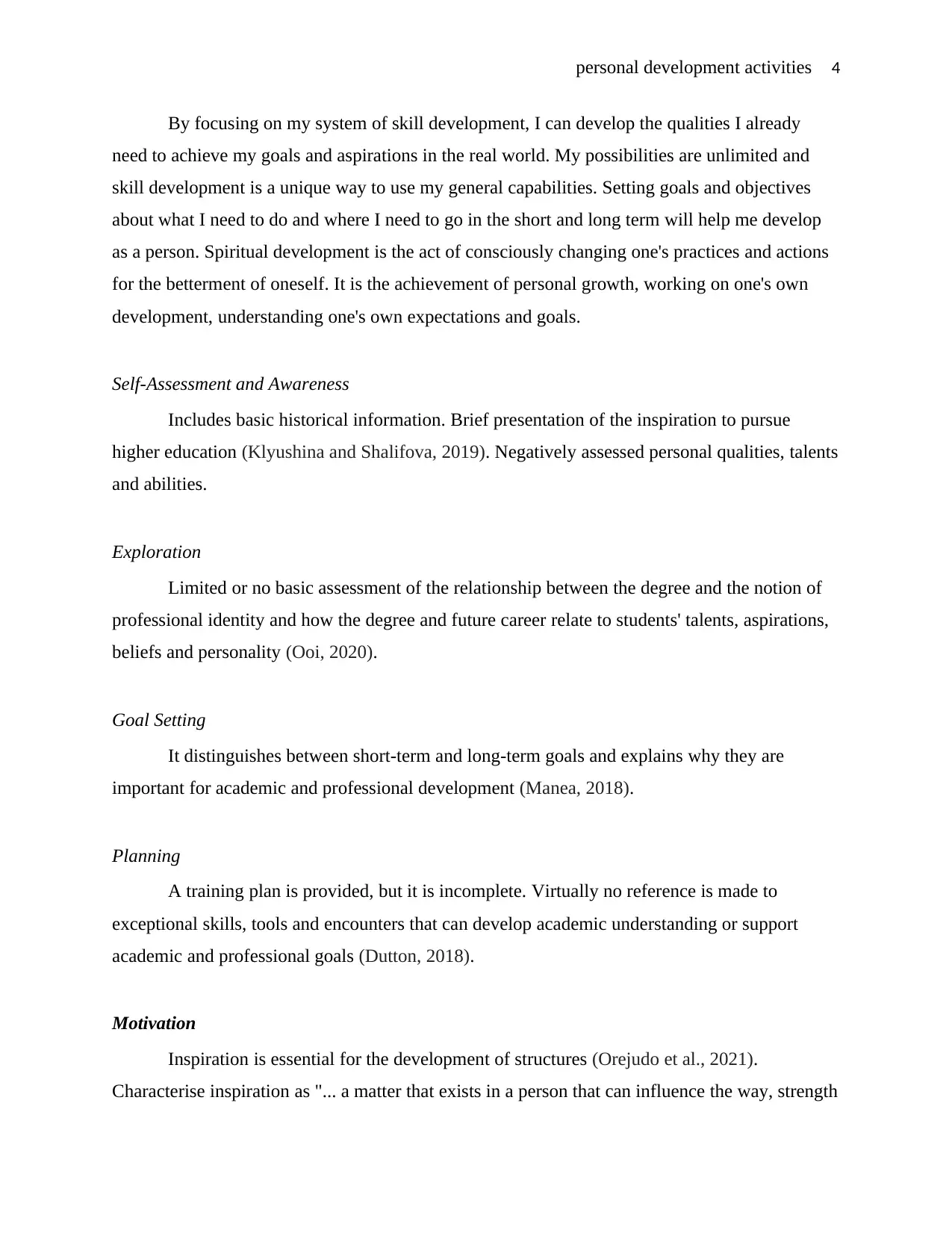
personal development activities 4
By focusing on my system of skill development, I can develop the qualities I already
need to achieve my goals and aspirations in the real world. My possibilities are unlimited and
skill development is a unique way to use my general capabilities. Setting goals and objectives
about what I need to do and where I need to go in the short and long term will help me develop
as a person. Spiritual development is the act of consciously changing one's practices and actions
for the betterment of oneself. It is the achievement of personal growth, working on one's own
development, understanding one's own expectations and goals.
Self-Assessment and Awareness
Includes basic historical information. Brief presentation of the inspiration to pursue
higher education (Klyushina and Shalifova, 2019). Negatively assessed personal qualities, talents
and abilities.
Exploration
Limited or no basic assessment of the relationship between the degree and the notion of
professional identity and how the degree and future career relate to students' talents, aspirations,
beliefs and personality (Ooi, 2020).
Goal Setting
It distinguishes between short-term and long-term goals and explains why they are
important for academic and professional development (Manea, 2018).
Planning
A training plan is provided, but it is incomplete. Virtually no reference is made to
exceptional skills, tools and encounters that can develop academic understanding or support
academic and professional goals (Dutton, 2018).
Motivation
Inspiration is essential for the development of structures (Orejudo et al., 2021).
Characterise inspiration as "... a matter that exists in a person that can influence the way, strength
By focusing on my system of skill development, I can develop the qualities I already
need to achieve my goals and aspirations in the real world. My possibilities are unlimited and
skill development is a unique way to use my general capabilities. Setting goals and objectives
about what I need to do and where I need to go in the short and long term will help me develop
as a person. Spiritual development is the act of consciously changing one's practices and actions
for the betterment of oneself. It is the achievement of personal growth, working on one's own
development, understanding one's own expectations and goals.
Self-Assessment and Awareness
Includes basic historical information. Brief presentation of the inspiration to pursue
higher education (Klyushina and Shalifova, 2019). Negatively assessed personal qualities, talents
and abilities.
Exploration
Limited or no basic assessment of the relationship between the degree and the notion of
professional identity and how the degree and future career relate to students' talents, aspirations,
beliefs and personality (Ooi, 2020).
Goal Setting
It distinguishes between short-term and long-term goals and explains why they are
important for academic and professional development (Manea, 2018).
Planning
A training plan is provided, but it is incomplete. Virtually no reference is made to
exceptional skills, tools and encounters that can develop academic understanding or support
academic and professional goals (Dutton, 2018).
Motivation
Inspiration is essential for the development of structures (Orejudo et al., 2021).
Characterise inspiration as "... a matter that exists in a person that can influence the way, strength
Paraphrase This Document
Need a fresh take? Get an instant paraphrase of this document with our AI Paraphraser
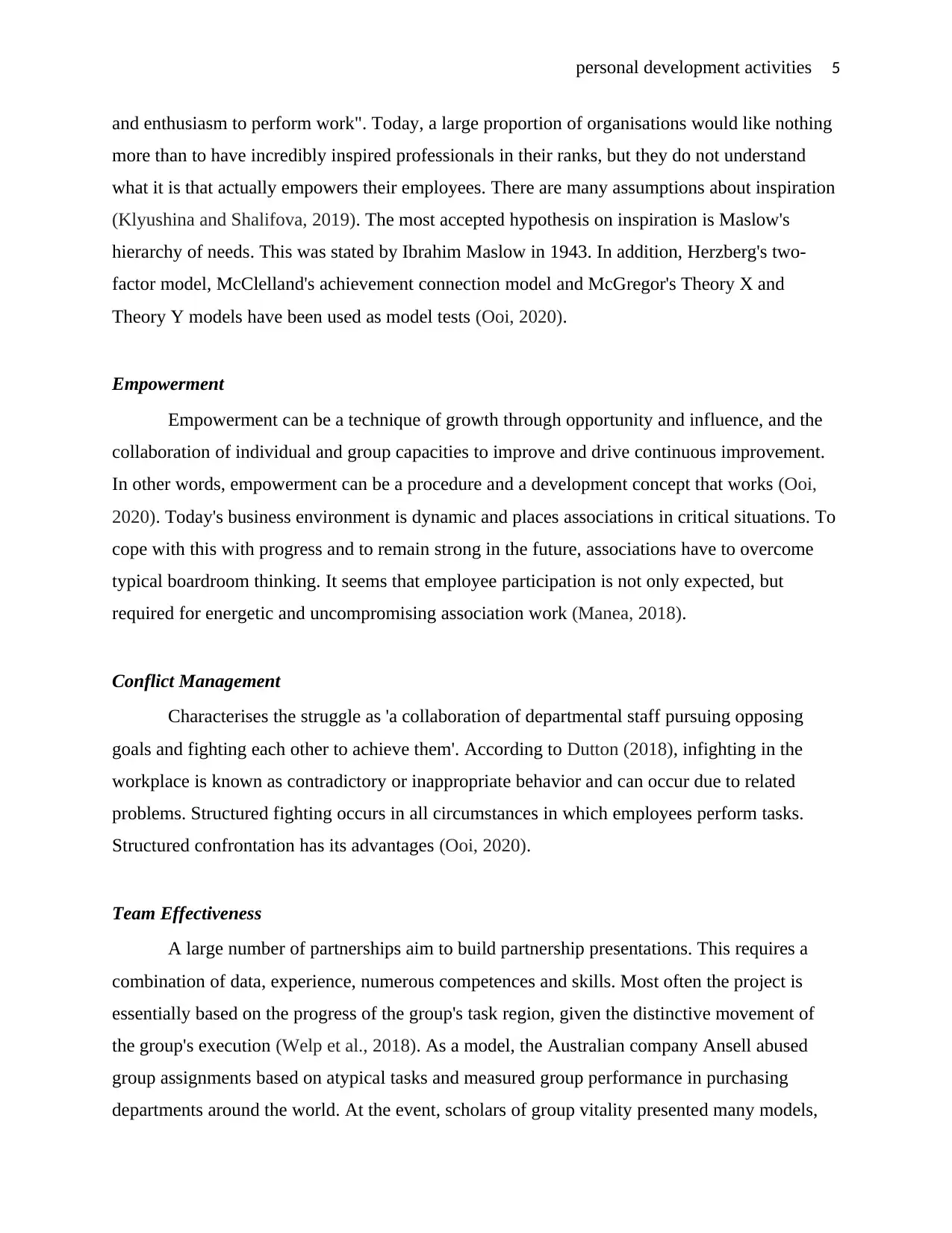
personal development activities 5
and enthusiasm to perform work". Today, a large proportion of organisations would like nothing
more than to have incredibly inspired professionals in their ranks, but they do not understand
what it is that actually empowers their employees. There are many assumptions about inspiration
(Klyushina and Shalifova, 2019). The most accepted hypothesis on inspiration is Maslow's
hierarchy of needs. This was stated by Ibrahim Maslow in 1943. In addition, Herzberg's two-
factor model, McClelland's achievement connection model and McGregor's Theory X and
Theory Y models have been used as model tests (Ooi, 2020).
Empowerment
Empowerment can be a technique of growth through opportunity and influence, and the
collaboration of individual and group capacities to improve and drive continuous improvement.
In other words, empowerment can be a procedure and a development concept that works (Ooi,
2020). Today's business environment is dynamic and places associations in critical situations. To
cope with this with progress and to remain strong in the future, associations have to overcome
typical boardroom thinking. It seems that employee participation is not only expected, but
required for energetic and uncompromising association work (Manea, 2018).
Conflict Management
Characterises the struggle as 'a collaboration of departmental staff pursuing opposing
goals and fighting each other to achieve them'. According to Dutton (2018), infighting in the
workplace is known as contradictory or inappropriate behavior and can occur due to related
problems. Structured fighting occurs in all circumstances in which employees perform tasks.
Structured confrontation has its advantages (Ooi, 2020).
Team Effectiveness
A large number of partnerships aim to build partnership presentations. This requires a
combination of data, experience, numerous competences and skills. Most often the project is
essentially based on the progress of the group's task region, given the distinctive movement of
the group's execution (Welp et al., 2018). As a model, the Australian company Ansell abused
group assignments based on atypical tasks and measured group performance in purchasing
departments around the world. At the event, scholars of group vitality presented many models,
and enthusiasm to perform work". Today, a large proportion of organisations would like nothing
more than to have incredibly inspired professionals in their ranks, but they do not understand
what it is that actually empowers their employees. There are many assumptions about inspiration
(Klyushina and Shalifova, 2019). The most accepted hypothesis on inspiration is Maslow's
hierarchy of needs. This was stated by Ibrahim Maslow in 1943. In addition, Herzberg's two-
factor model, McClelland's achievement connection model and McGregor's Theory X and
Theory Y models have been used as model tests (Ooi, 2020).
Empowerment
Empowerment can be a technique of growth through opportunity and influence, and the
collaboration of individual and group capacities to improve and drive continuous improvement.
In other words, empowerment can be a procedure and a development concept that works (Ooi,
2020). Today's business environment is dynamic and places associations in critical situations. To
cope with this with progress and to remain strong in the future, associations have to overcome
typical boardroom thinking. It seems that employee participation is not only expected, but
required for energetic and uncompromising association work (Manea, 2018).
Conflict Management
Characterises the struggle as 'a collaboration of departmental staff pursuing opposing
goals and fighting each other to achieve them'. According to Dutton (2018), infighting in the
workplace is known as contradictory or inappropriate behavior and can occur due to related
problems. Structured fighting occurs in all circumstances in which employees perform tasks.
Structured confrontation has its advantages (Ooi, 2020).
Team Effectiveness
A large number of partnerships aim to build partnership presentations. This requires a
combination of data, experience, numerous competences and skills. Most often the project is
essentially based on the progress of the group's task region, given the distinctive movement of
the group's execution (Welp et al., 2018). As a model, the Australian company Ansell abused
group assignments based on atypical tasks and measured group performance in purchasing
departments around the world. At the event, scholars of group vitality presented many models,
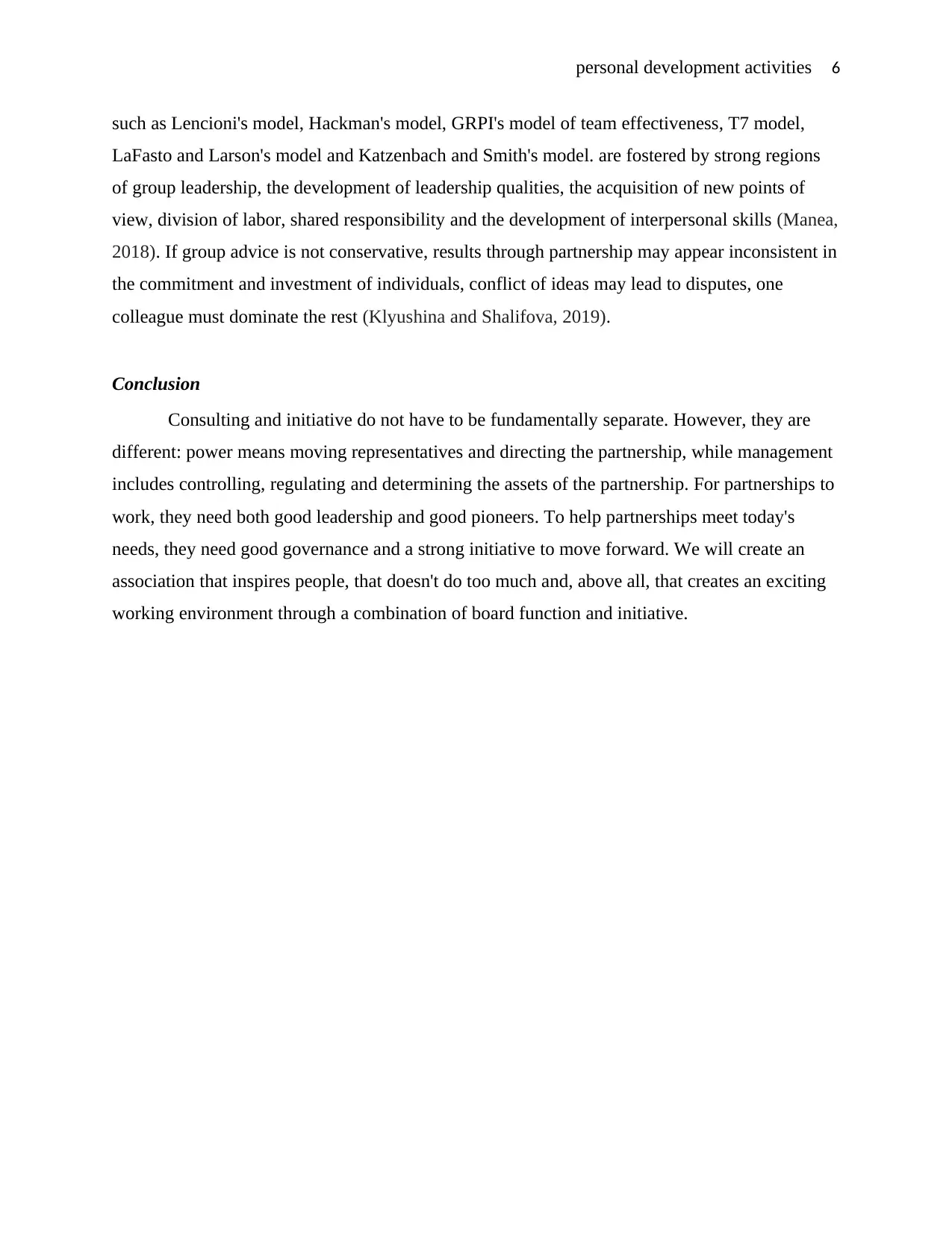
personal development activities 6
such as Lencioni's model, Hackman's model, GRPI's model of team effectiveness, T7 model,
LaFasto and Larson's model and Katzenbach and Smith's model. are fostered by strong regions
of group leadership, the development of leadership qualities, the acquisition of new points of
view, division of labor, shared responsibility and the development of interpersonal skills (Manea,
2018). If group advice is not conservative, results through partnership may appear inconsistent in
the commitment and investment of individuals, conflict of ideas may lead to disputes, one
colleague must dominate the rest (Klyushina and Shalifova, 2019).
Conclusion
Consulting and initiative do not have to be fundamentally separate. However, they are
different: power means moving representatives and directing the partnership, while management
includes controlling, regulating and determining the assets of the partnership. For partnerships to
work, they need both good leadership and good pioneers. To help partnerships meet today's
needs, they need good governance and a strong initiative to move forward. We will create an
association that inspires people, that doesn't do too much and, above all, that creates an exciting
working environment through a combination of board function and initiative.
such as Lencioni's model, Hackman's model, GRPI's model of team effectiveness, T7 model,
LaFasto and Larson's model and Katzenbach and Smith's model. are fostered by strong regions
of group leadership, the development of leadership qualities, the acquisition of new points of
view, division of labor, shared responsibility and the development of interpersonal skills (Manea,
2018). If group advice is not conservative, results through partnership may appear inconsistent in
the commitment and investment of individuals, conflict of ideas may lead to disputes, one
colleague must dominate the rest (Klyushina and Shalifova, 2019).
Conclusion
Consulting and initiative do not have to be fundamentally separate. However, they are
different: power means moving representatives and directing the partnership, while management
includes controlling, regulating and determining the assets of the partnership. For partnerships to
work, they need both good leadership and good pioneers. To help partnerships meet today's
needs, they need good governance and a strong initiative to move forward. We will create an
association that inspires people, that doesn't do too much and, above all, that creates an exciting
working environment through a combination of board function and initiative.
⊘ This is a preview!⊘
Do you want full access?
Subscribe today to unlock all pages.

Trusted by 1+ million students worldwide
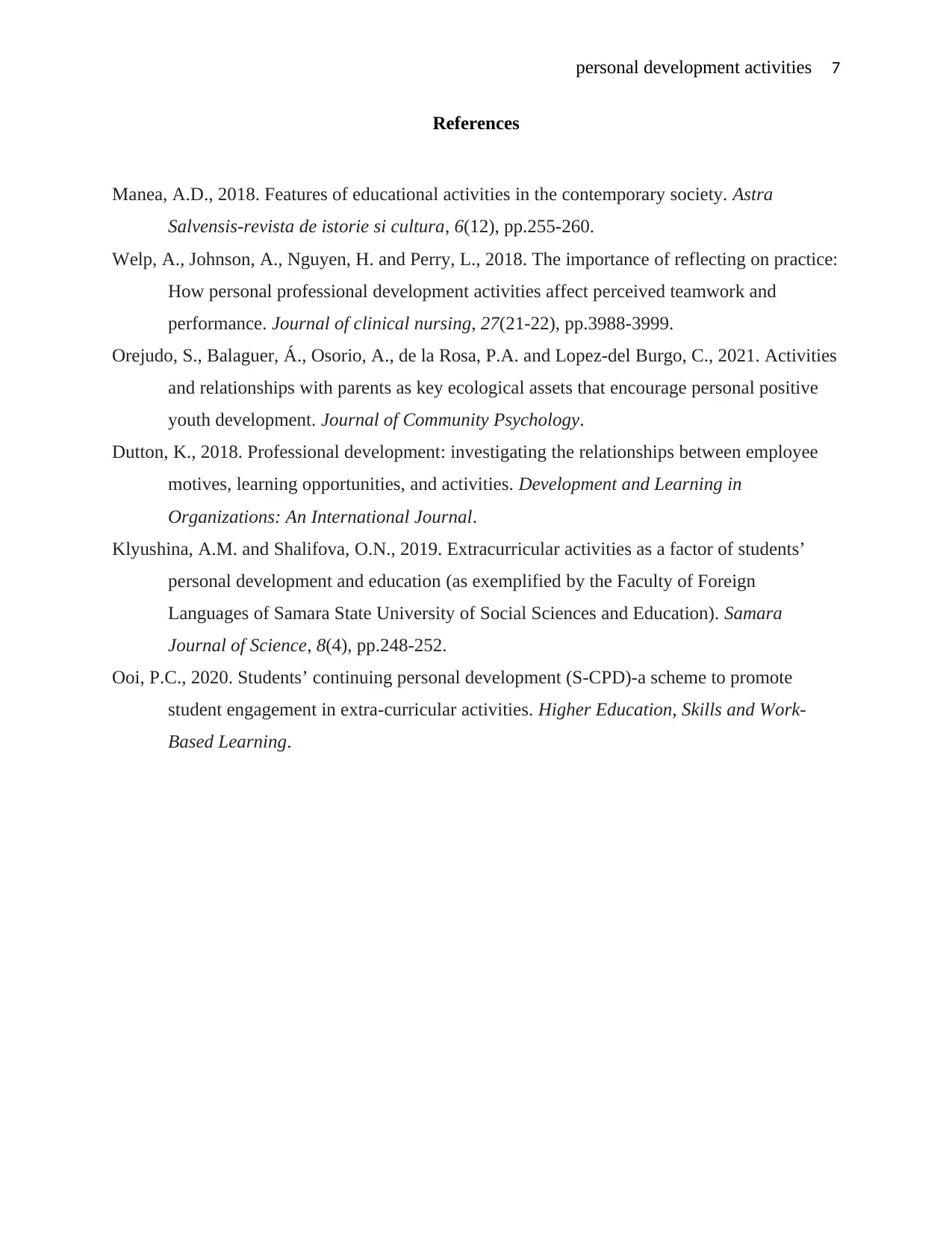
personal development activities 7
References
Manea, A.D., 2018. Features of educational activities in the contemporary society. Astra
Salvensis-revista de istorie si cultura, 6(12), pp.255-260.
Welp, A., Johnson, A., Nguyen, H. and Perry, L., 2018. The importance of reflecting on practice:
How personal professional development activities affect perceived teamwork and
performance. Journal of clinical nursing, 27(21-22), pp.3988-3999.
Orejudo, S., Balaguer, Á., Osorio, A., de la Rosa, P.A. and Lopez‐del Burgo, C., 2021. Activities
and relationships with parents as key ecological assets that encourage personal positive
youth development. Journal of Community Psychology.
Dutton, K., 2018. Professional development: investigating the relationships between employee
motives, learning opportunities, and activities. Development and Learning in
Organizations: An International Journal.
Klyushina, A.M. and Shalifova, O.N., 2019. Extracurricular activities as a factor of students’
personal development and education (as exemplified by the Faculty of Foreign
Languages of Samara State University of Social Sciences and Education). Samara
Journal of Science, 8(4), pp.248-252.
Ooi, P.C., 2020. Students’ continuing personal development (S-CPD)-a scheme to promote
student engagement in extra-curricular activities. Higher Education, Skills and Work-
Based Learning.
References
Manea, A.D., 2018. Features of educational activities in the contemporary society. Astra
Salvensis-revista de istorie si cultura, 6(12), pp.255-260.
Welp, A., Johnson, A., Nguyen, H. and Perry, L., 2018. The importance of reflecting on practice:
How personal professional development activities affect perceived teamwork and
performance. Journal of clinical nursing, 27(21-22), pp.3988-3999.
Orejudo, S., Balaguer, Á., Osorio, A., de la Rosa, P.A. and Lopez‐del Burgo, C., 2021. Activities
and relationships with parents as key ecological assets that encourage personal positive
youth development. Journal of Community Psychology.
Dutton, K., 2018. Professional development: investigating the relationships between employee
motives, learning opportunities, and activities. Development and Learning in
Organizations: An International Journal.
Klyushina, A.M. and Shalifova, O.N., 2019. Extracurricular activities as a factor of students’
personal development and education (as exemplified by the Faculty of Foreign
Languages of Samara State University of Social Sciences and Education). Samara
Journal of Science, 8(4), pp.248-252.
Ooi, P.C., 2020. Students’ continuing personal development (S-CPD)-a scheme to promote
student engagement in extra-curricular activities. Higher Education, Skills and Work-
Based Learning.
1 out of 7
Related Documents
Your All-in-One AI-Powered Toolkit for Academic Success.
+13062052269
info@desklib.com
Available 24*7 on WhatsApp / Email
![[object Object]](/_next/static/media/star-bottom.7253800d.svg)
Unlock your academic potential
Copyright © 2020–2026 A2Z Services. All Rights Reserved. Developed and managed by ZUCOL.




